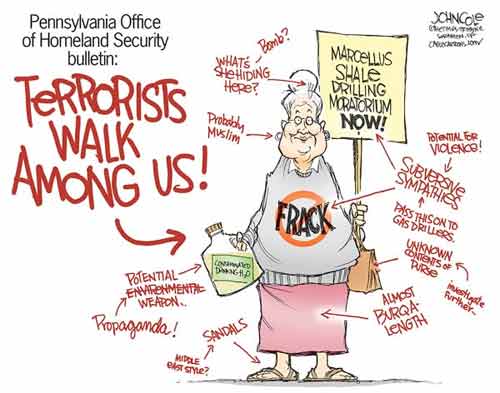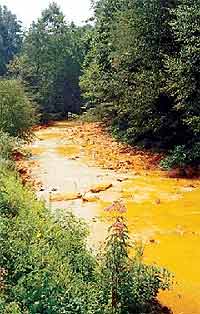Press
Residents of others states are issuing words of warning for New Yorkers who may soon allow companies to use the "fracking" process to drill for natural gas.
I live and work in Marcellus shale ground zero -- central New York State, just south of the Finger Lakes, one of the biggest and best watersheds in the hemisphere. My home is in economically challenged, mostly rural Tioga County, and I work in Tompkins County. Almost all our neighbors for several miles around have signed gas leases. I participate regularly and actively as a client, colleague, patient, or volunteer with businesses, organizations, and institutions in 19 other New York counties.
I have been economically poor and landless, economically comfortable and landless, comfortable and landed, and poor and landed. I've been rural, suburban, and urban. And I've spent most of my adult life paying state and local taxes in New York State (and a whole lot of national taxes, most of which have gone toward things I do not condone).
Writer Maura Stephens lives in the hills outside Spencer, New York. She wrote this using voice recognition software.
Evidence that Pennsylvania’s Department of Homeland Security is working on behalf of the natural gas industry came to light in early September when internal department bulletins were leaked to an anti-drilling listserve. The department had contracted an Israeli-linked agency to spy on anti-drilling activists.
The story was later leaked to reporters at Pro Publica and the City Paper. These papers’ articles suggested a direct connection between the state agency and the natural gas industry. The exposure fueled outrage from targeted groups.
Gov. Ed Rendell had to retreat. On Sept. 14, he held a press conference to apologize to groups who had been monitored. “Protesting is not a threat, it’s an American right,” said Rendell. He said he was “appalled” and announced that the state would not renew its $125,000 no-bid contract with the Institute of Terrorism Research and Response, set to expire in October.
See: Pa. Governor Apologizes for Tracking Enviro Extremists, but Questions Remain - ProPublica
Anne C. Mulkern, Greenwire. May 7, 2009. New York Times.
Fearing a push by House Democrats to regulate a controversial form of natural gas production, an industry coalition [Energy in Depth] launched a campaign yesterday arguing that new rules would kill jobs and batter the economy. [See Sourcewatch: Energy in Depth]
The coalition of independent oil and gas companies says a Democratic proposal to allow new oversight over hydraulic fracturing would slash domestic oil and gas production and cost the Treasury $4 billion in lost taxes, royalties, rents and other payments. But environmentalists and an aide to a Democratic lawmaker backing regulation say the claim amounts to "scare tactics."
...The 2005 Energy Policy Act exempted hydraulic fracturing from regulation under the Safe Water Drinking Act. But Rep. Diana DeGette (D-Colo.) proposed a bill last year to repeal that exemption. DeGette is now talking with Energy and Commerce Chairman Henry Waxman (D-Calif.) about either inserting her bill into pending climate legislation or reintroducing the measure on its own.
"We're hoping to move this forward shortly," DeGette spokesman Kristofer Eisenla said. Without federal oversight, he said, there is no way to really track whether the process is safe.
2010-09-18. Perhaps it’s the case that there aren’t enough real terrorists to track in the Keystone State.
John Cole has been The Times-Tribune's editorial cartoonist since April 2005. He draws five to seven full-color cartoons weekly.
See: Proposed gas drilling ban in city wins friends, foes such as Tom Ridge
See: Homeland Security in Cahoots with Fracking Gas Corporations
See: Pa. Governor Apologizes for Tracking Enviro Extremists, but Questions Remain - ProPublica
Mike Dennison. March 18, 2010. Billings Gazette.
"The state Land Board, undeterred by anti-mining protesters who disrupted the board’s Helena meeting for 45 minutes until they were arrested, voted 3-2 Thursday to approve leasing 570 million tons of state-owned coal for development of a mine in southeastern Montana’s Otter Creek Valley.
The vote by the five-member Land Board approved an $85.8 million up-front bid on the coal by Arch Coal Inc., giving the St. Louis-based mining giant a 10-year window to develop a mine in the pristine valley 150 miles east of Billings.
Gov. Brian Schweitzer, who voted for leasing the coal, extolled the long-term economic benefits of a new coal mine in the valley, saying it would bring $5 billion in tax revenue and royalties over the life of a mine and approximately $250 million a year once the mine is operating...
...The vote came after five protesters disrupted the meeting by chanting “Hands off Otter Creek — you’re not listening!” as McCulloch made a motion to vote to approve the lease.
The protesters, who had been sitting in the front row of chairs in the packed meeting room, stood and then linked arms as they sat on the floor, chanting, about 20 feet from the board members.
Schweitzer recessed the meeting and Helena Police officers ordered the room cleared, as they waited for other officers to arrive and assist with arresting the protesters. About 45 minutes later, police had handcuffed and arrested the protesters and taken them to the Lewis and Clark County jail to book them on misdemeanor charges of disorderly conduct."
Genevieve Schroder is removed from the State Land Board meeting Thursday in the Capitol. Schroder and four other Missoula residents were arrested after protesting the leasing of the state-owned Otter Creek coal. (Courtesy photo)By Mark Schleifstein, The Times-Picayune. New Orlean, LA., December 18, 2009.
"The state Department of Environmental Quality has demanded that the federal Environmental Protection Agency rescind its recent finding that greenhouse gases endanger present and future generations, and take no action to require industries and small businesses to reduce greenhouse gas emissions."
Eyal Press. The Nation. September 23, 2004.
This article appeared in the October 11, 2004 edition of The Nation.
"...Beginning under the Clinton Administration, the federal government pushed to expand production of this comparatively clean-burning fossil fuel, although Clinton also protected millions of acres of public land from drilling.
The Bush Administration, by contrast, has called for removing all "restrictions and impediments" on domestic development, code language for opening dozens of pristine natural habitats to unfettered leasing..."
Series: Buried Secrets: Gas Drilling's Environmental Threat.
Drilling companies assert that the destructive forces unleashed by the fracturing process, including the sometimes toxic chemicals that keep the liquid flowing, remain safely sealed as much as a mile or more beneath the earth, far below drinking water sources and the rest of the natural environment.
More than a year of investigation by ProPublica, however, shows that the issues are far less settled than the industry contends, and that hidden environmental costs could cut deeply into the anticipated benefits.
The technique used to extract the gas, known as hydraulic fracturing, has not received the same scientific scrutiny as the processes used for many other energy sources.
Truthout is a source of independent journalism focusing on under-covered issues and uncoventional thinking.
In papers everywhere we hear arguments such as the one that appeared recently in the Rochester (NY) Business Journal, in an article by economist Raymond J. Keating, under the heading "N.Y. is missing out on economic opportunity."
Keating wrote, "Environmentalists are claiming that hydraulic fracturing threatens groundwater supplies and are using anecdotal evidence to support their claims. Yet years of evidence have demonstrated that the fracking process is safe."
This is not just misleading; it's artful misuse of the language. Or, as my mother would have put it in her habitually blunt way, it's a lie...
...If they have nothing to hide, and there is no danger, why do they keep the ingredients of their toxic fracking stews a secret? Why does the public not know what's in them? How can Keating or anyone else claim it's "safe" if we don't know what they're using? Do we want New York to be the next Gulf? Do we want to just trust the drilling companies to do the right thing, as we seemed to trust BP to manage a spill without adverse consequences?
Furthermore, do New Yorkers want their beautiful state turned into an industrial zone, a la eastern Colorado, huge swaths of Wyoming, much of Texas and Louisiana, and West Virginia? Take a drive to Northeastern Pennsylvania and see what the countryside looks like just a few years after horizontal fracking began there.
Well over half of these United States are in peril from fracking. This is simply nuts. It's not a local or regional, but a national issue (international now, as big gas deposits have been located, and in some cases are already being developed, in Poland, Austria, Hungary, Sweden, Ukraine, the United Kingdom, in Canada, China, and India. (Japan and other countries are buying into gas-drilling rights in the USA and elsewhere.)
See: Global Gas Flaring Identification in Google Earth
See: World of Shale
See: France to Unlock “Dirty” Oil Under Paris With Texan Help
West Virginians who live near streams polluted by coal mining are more likely to die of cancer, according to a first-of-its kind study published by researchers at West Virginia University and Virginia Tech.
The study provides the first peer-reviewed look at the relationship between the biological health of Appalachian streams and public health of coalfield residents.
See: Ken Ward Jr. "Breaking news: EPA vetoes Spruce Mine permit." Coal Tattoo. Jan. 13, 2011.
See: Mixplex | EPA in the Crosshairs.
See: Lisa P. Jackson, EPA (lisapjackson) on Twitter.
See: Nathaniel P Hitt. U.S. Geological Survey, Eastern Region, Northeast Area, Biology Discipline.
Hitt, Nathaniel P., and Michael Hendryx. “Ecological Integrity of Streams Related to Human Cancer Mortality Rates.” EcoHealth 7, no. 1 (March 2010): 91-104.
See: Nathaniel P Hitt. U.S. Geological Survey, Eastern Region, Northeast Area, Biology Discipline.


















